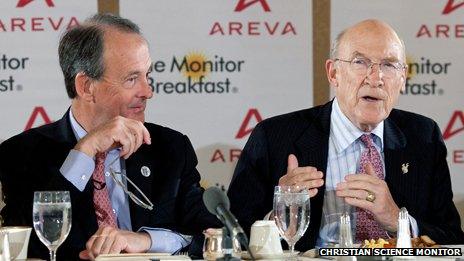Fiscal cliff: Simpson and Bowles gloomy on deal chances
- Published
- comments

Bowles, left, and Simpson have been called "an improbable buddy act"
Over bacon and eggs and bagels and muffins in a fancy hotel in Washington, one of the US capital's oddest double acts is sounding the alarm.
The American republic, say Erskine Bowles and Alan Simpson, is heading toward the edge of the cliff. Without a deal on tax and spending "we have no idea where it will go".
Perhaps 40 members of Washington's press corps are in the room. Under four huge chandeliers a long table is littered with audio recorders and notepads. TV lights illuminate the scene to an almost maddening brightness. Silverware shines, and light bounces off glasses of iced water.
Both men are softly spoken - the journalists lean in to catch their words.
Mr Bowles is a former White House chief of staff under Bill Clinton. Mr Simpson was a Wyoming senator for almost two decades.
Together they chaired a commission that came up with the last plan - never adopted - to cut the US budget deficit and send its debt in a more stable direction.
They are sounding the alarm over the crunch that will come on 1 January if Congress and the White House can't come up with a deal on tax and spending.
Economic gains threatened
The crunch - the "fiscal cliff" to those who eat and breathe this sort of stuff - is a combination of tax rises and spending cuts that would suck more than $500 billion out of the economy.
The impact of such a sharp reduction in government spending and individual income, reckons the Congressional Budget Office, would be to shrink the economy by 0.5% of GDP (compared to 1.7% projected growth) and add more than a percentage point to unemployment.
It would undo, in short, the rather meagre gains of the past three years.
Mr Bowles sounds almost impossibly gloomy about reaching an agreement on tax and spending to avert the automatic tax rises and spending cuts. He sees a one-in-three chance Democrats and Republicans in Washington can reach a deal.
Mr Simpson talks about about the US reaching a "tipping point" when creditors see a "totally dysfunctional government kicking the can down the road" and decide they want more in return for their loans. And who gets hurt? he asks. "The little guy."
He likes this kind of language - folksy, sometimes pungent turns of phrase. Some Republicans are "as rigid as a fireplace poker but without the occasional warmth". Leaders need to "go big or go home". Playing politics with this issue is "like betting your country".
Everyone around the table - and everyone in political Washington - knows the kind of deal that would avert the fiscal cliff: some tax rises, some tax reform, some spending cuts, and some reform to the giant social programmes to trim future spending.
But the consensual middle has been sucked out of Washington in the past decade or so. Sometimes it seems people have forgotten how to make a deal.
'I'm really worried'
Mr Bowles speaks with less flourish, but is stark about the risks of continuing disagreement.
Already, he says, businessmen are delaying investment and not replacing workers.
Consumer confidence will begin to dip without a deal, and even if a deal is reached in the days immediately after the deadline there will be damage to the economy.
"I'm really worried," he says. "I believe the problem is that we are going over the cliff. It will be horrible for the economy."
There are some signs, both men say, of compromise at the edges. Some legislators have renounced a "no tax-rise" pledge they made. The election has given both sides a bit of wiggle room.
But neither man came to breakfast to give a pep talk. You can almost reach out and touch the gloom they feel about the process. Time is running out, says Mr Bowles, and there's still a big distance between the sides.
From Mr Simpson, the former mountain state senator, comes a populist cry. Americans, he says, "are thirsting for someone to tell them the truth, rather than the hogwash from both parties".
But from Mr Bowles comes a cold dose of Washington realism, and what seems to be the prime driver of his pessimism.
"There's been no punishment," he says, "for intransigence in this town."